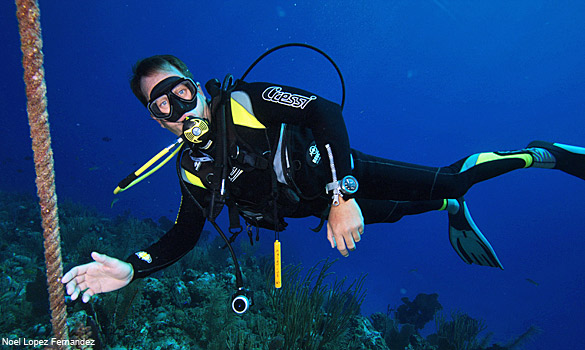Cuban Scientist Fabián Pina Amargós Awarded 2012 Pew Fellowship in Marine Conservation
Project to Improve Protection of Goliath Grouper in Cuba and U.S.
 Fabián Pina Amargós, Ph.D., a scientist with the Centro de Investigaciones de Ecosistemas Costeros (Center for Coastal Ecosystems Research) in Cayo Coco, Cuba, has been awarded a 2012 Pew Fellowship in Marine Conservation for his project to study and conserve goliath grouper populations in Cuba. This Pew Marine Fellowship award is the first presented for research in Cuba and will be conducted under a license from the U.S. Treasury Department.
Fabián Pina Amargós, Ph.D., a scientist with the Centro de Investigaciones de Ecosistemas Costeros (Center for Coastal Ecosystems Research) in Cayo Coco, Cuba, has been awarded a 2012 Pew Fellowship in Marine Conservation for his project to study and conserve goliath grouper populations in Cuba. This Pew Marine Fellowship award is the first presented for research in Cuba and will be conducted under a license from the U.S. Treasury Department.
The Pew Fellows Program in Marine Conservation is a prestigious program that gives recipients US$150,000 for a three-year project designed to address conservation challenges facing our oceans. Dr. Pina Amargós' fellowship will seek to establish important scientific information and better management recommendations for goliath grouper in Cuba, the Caribbean, and the Gulf of Mexico.
“Goliath grouper, which were once very abundant in Cuba, are now facing declines with little protection,” said Dr. Pina Amargós. “With this Pew Marine Fellowship I can ensure that key policy makers have the best scientific information about what may be harming these creatures and how to better protect their populations.”
Goliath grouper, which often weigh 400 pounds at maturity, began to decline in the 1960s after increased fishing on spawning grounds and overfishing of adult grouper. Today, the fish are presumably overexploited in Cuba. Over the course of three years, Dr. Pina Amargós will gather scientific data on the fish using underwater surveys and ultrasonic tags. He hopes to gather biological information about the fish, such as growth patterns and diet, as well as document catch of the species. He will then use the data to promote conservation efforts for the goliath grouper nationally, with a focus in southeastern Cuba. Through an international exchange, this research will also assist other scientists working to protect goliath group by providing data for the broader Caribbean and Gulf of Mexico ecosystems.
“The goliath grouper is a fascinating and charismatic fish, but little has been done to protect them in Cuba,” said Joshua S. Reichert, managing director of the Pew Environment Group. “Dr. Pina Amargós' study will shed light on how and where goliath grouper grow, and will encourage an exchange of data among countries to better protect these extraordinary creatures.”
Dr. Pina Amargós received his Ph.D. in biological sciences from the University of Havana. His work has been recognized internationally through awards and collaboration that include the Canadian International Development Agency Scholarship for Master of Marine Management Program at Dalhousie University; participation in the Ad Hoc Technical Expert Group on Mariculture, established by the Convention on Biological Diversity in Italy; and the Fellowship of the Secretariat of the Convention on Biological Diversity in Canada. His research on the value and effects of marine and coastal protected areas on the biological diversity and community involvement in marine and coastal protected areas has been published in technical reports and peer-reviewed publications.
The Pew Fellows Program in Marine Conservation has awarded 125 fellowships to individuals from 32 countries. The Pew Marine Fellowships fund science and other projects that address critical challenges in the conservation of the ocean. Through a rigorous nomination and review process, a committee of marine specialists from around the world selects Pew Marine Fellows based on the strengths of their proposed projects, including their potential to protect ocean environments. Unique and timely projects led by outstanding professionals in their fields are chosen annually, targeting individuals who are mid-career. The program is managed by the Pew Environment Group, based in Washington, D.C.
More information about each of the 2012 Pew Marine Fellows, including photographs and a video about the recipients, is available at www.pewmarinefellows.org.






